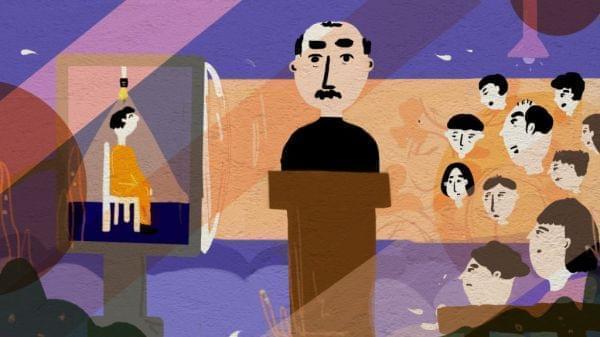Video Court; Job Opportunities For Felony Convicts; Japanese-American Resettlement in Peoria

Victoria Nieto/Illinois Newsroom
On The 21st: If you’ve ever been convicted of a felony, finding a job is a big challenge. Now there’s a law that might help. Plus, during World War II, the U.S. forced millions of Japanese-Americans into internment camps. More than 10,000 people moved to Illinois during that time, including the city of Peoria. But first, many courtrooms are having bond and arraignment hearings through a TV monitor instead of in person. This can be more efficient, but is it fair to defendants?
An arraignment hearing is usually when you get a chance to plead guilty or not guilty. It’s also when the court decides whether or not to formally charge you with a crime. Today, many courthouses substitute those hearings, as well as bond hearings (that used to occur in person) with video court.
Although video court can be efficient, saving time, money and some also say it is more safe, it also poses concerns for others. A few years after a lawsuit challenging the process in Cook County, it was discontinued. It was also discontinued around the same time in Winnebago County. But many other places in Illinois: Champaign, Kankakee, and Peoria still use video courts.
That’s based on reporting by the Illinois Newsroom’s Lee Gaines, who joined us in studio, along with one of the people she spoke with for her story: Charles Davidson.
Rosalie Joy also joined us on the line. She is the Vice President and Defender of Legal Services at the National Legal Aid & Defender Association.
Locke Bowman was also with us. He's a Professor of Law at Northwestern University.
Rosalie Joy, VP at @NLADA says that video conferencing is on the rise, especially as agencies try to cut costs.
— The 21st (@21stShow) October 3, 2018
Despite this, she says video court presents "barriers and challenges to the process and the ability of the attorneys to effectively represent their clients."
Plus-
When it comes to our criminal justice system and lowering recidivism, we often hear about the role that employment plays in keeping people from returning to prison.
Well now, the state has opened up more opportunities for residents with criminal records. Opportunities that have long been closed. Licensing laws for more than 100 jobs have been made more accessible to people with criminal backgrounds. Lawmakers have also expanded the types of convictions that can be sealed from employers. If you consider that more than 27,000 people left Illinois prisons last year, this could mean a lot more people able to look for and get a job.
Sodiqa Williams joined us on the line. She is the Vice President of Policy and External Affairs with the Safer Group, an organization that works to support people with arrest and conviction records.
Johnny C. Taylor Jr. also spoke with us. He’s President and CEO of the Society for Human Resource Management.
But first, we heard from Casandis Hunt. She is a Champaign resident who was previously incarcerated and now works at the University of Illinois. She also serves as peer mentor with the First Followers re-entry program.
Employers’ personal biases and fears interfere with the hiring, so people who would otherwise be very qualified would not get the chance, explains @Sodi_Rose from the @SaferFoundation.
— The 21st (@21stShow) October 3, 2018
“Banning the box in the early stages of the process was very important.”
And-
After the attack on Pearl Harbor in 1941, President Franklin Roosevelt and the United States formally entered World War II. But, the value of hindsight shows us that speech was more than just a declaration of war on the Japanese abroad. It also, in many ways, ending up becoming a declaration against Japanese-American citizens living on U.S. soil.
In February of 1942, President Roosevelt signed Executive Order 9066, which forced more than 100 thousand Japanese-Americans out of their homes and into U.S camps.
With the help of the War Relocation Authority, a quarter million Japanese-Americans moved to the Midwest where the welcome was rumored to be less hostile than other areas out West. Throughout the 1940s, nearly half of those people moved to Illinois.
Rustin Gates has been researching Japanese-American resettlement in Central Illinois, specifically in Peoria, Illinois. Rustin is an Associate Professor of History at Bradley University and he joned us on the line.
Tina Morris is also spoke with us. She is a student at Bradley University.
Megan White joined us in the studio. Megan is in the History Department at the University of Illinois Urbana-Champaign.
Rustin Gates and Tina Morris from @bradleyu penned this piece on Japanese-American resettlement in Peoria after World War II.
— The 21st (@21stShow) October 3, 2018
Read more here: https://t.co/LHNZvZUHIP

